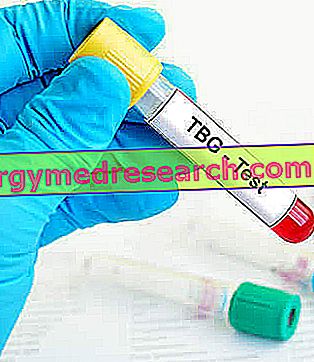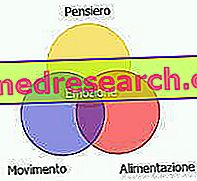Definition
Menopause marks the end of a woman's fertile age: it is a complex period, not always accepted positively by women, characterized by a series of signs and symptoms of a psychological, physical, emotional and social nature. We speak of menopause properly said after at least 12 months from the disappearance of menstruation; the period coinciding with the menopause and the preceding months is called climacteric.
Causes
Menopause is the result of the physiological decline in the synthesis of female sex hormones (estrogens), essentially linked to aging; the drastic decrease in sex hormones is a consequence of the depletion of ovarian follicles. It is assumed that some chemo and radiotherapy can help to anticipate the arrival of menopause; moreover, menopause can be the expression of a primary ovarian failure (starting from autoimmune diseases or genetic predisposition).
Symptoms
The symptoms that accompany menopause, just like those of premenstrual syndrome, cannot be defined with certainty, since every woman reacts subjectively to this delicate period of life. Given that the characteristic symptoms of this period tend to progressively begin, the most common ones are mentioned below: fatigue, anxiety, decreased sexual desire, irregular menstrual cycle, depression, difficulty concentrating and falling asleep, dyspareunia, joint pain, irritability, palpitations, dry skin, vaginal dryness, night sweats, hot flushes.
Natural Care
Information on Menopause - Drugs for the Treatment of Menopause Symptoms are not intended to replace the direct relationship between health professional and patient. Always consult your doctor and / or specialist before taking Menopause - Drugs for the Treatment of Menopause Symptoms.
drugs
It would be unfair to talk about drugs for treating menopause, since it is certainly not a disease that is being discussed. Menopause, rather, is a phase of life, not easy to overcome with simplicity for all women. The drugs that we will address in this disquisition, therefore, are not indicated to cure menopause, but to lighten the symptoms that accompany this difficult period.
Considering the delicacy of the menopausal period, family members are recommended to take care of menopausal women, trying not to burden their psycho-physical situation, often morally sad, fatigued and depressed.
We have seen that the hormonal estrogenic alteration of the woman during the postmenopausal period is permanent; despite what has been said, hot flashes (a typical symptom present in 70% of menopausal women) tend to self-purify a few years after the end of menstruation. However, other symptoms may not only remain, but even worsen (for example, vaginal atrophy).
Among the best therapeutic options, it seems that hormone replacement therapy is particularly effective: this treatment involves taking a low-dose estrogen, normally associated with a progestin, and it is shown to relieve hot flashes.
As we have analyzed, menopause can also be accompanied by a drop in mood: in this case, the administration of antidepressants is indicated, useful also for controlling hot flushes.
Osteoporosis is also a rather common condition for menopausal women: in similar situations, it is recommended to follow a therapeutic path aimed at strengthening the bone structure .
Vaginal dryness can be lightened by applying a cream with an emollient, nourishing and lubricating action, to be used also during intercourse.
Hormone therapy : the aim of this treatment is the cure of symptoms, useful for improving the quality of life of menopausal women. Estrogens and progestogens can be administered orally, transdermally or transvaginally. Generally speaking, estrogen therapy is indicated to treat vaginal atrophy: the duration of treatment is a few weeks but, when necessary, it can be repeated. Long-term estrogen therapy is reserved exclusively for women without uterus.
Hormone replacement therapy has no contraceptive effect: a woman can still consider herself fertile for another 2 years from the last menstruation; therefore, if the woman wants a contraceptive effect, it is essential to take the estrogen progestin pill with low doses of estrogen.
- Estradiol (eg. Ephelia, Climara, Estrofem): a drug belonging to the estrogen class, whose indicative dosage suggests to administer max. 2 mg of drug a day.
- Estriol (eg Ovestin): the drug is an estrogen indicated in the prevention and treatment of symptoms associated with estrogen deficiency in the menopausal period. The drug is available in 1 mg tablets: in general, the dosage involves taking one or maximum two tablets a day.
- Medroxyprogesterone Acetate (eg Farlutal, Provera, Premia): it is a progestin drug, often available in tablets of 10-20 mg of active ingredient; the dosage should be determined by the doctor. Orally, it is recommended to take this progestin medication at a dose of 10-20 mg a day. Also available associated with estradiol (eg Filena). The drug is also indicated to improve the lipidemic profile of menopausal women, reducing the risk of developing coronary heart disease.
- Progesterone (eg Prontogest, Prometrium): this progestin drug must be taken transdermally (application of a medicated, slow-release plaster). The patch releases 100-200 mg a day. Only in some cases, a higher dose is recommended (300 mg). The drug, in addition to being used in therapy for the control of symptoms associated with menopause, is used to treat gynecological disorders, such as metrorrhagia, amenorrhea, polymenorrhea, etc.
- Ethinyl estradiol (eg Ethinyl estradiol Amsa): indicated for the control of the symptoms that characterize menopause, as well as preventing postmenopausal osteoporosis. The drug is available in tablets of 10-50-100 mg. The dosage should be carefully determined by the doctor based on the severity of the symptoms the woman complains about.
- Tibolone (eg Livial): this drug has estrogenic, progestin and weakly androgenic activity, and is used in therapy to lighten menopausal disorders associated with osteoporosis and to treat vasomotor symptoms. The drug should be taken continuously, without adding a progestin. Indicatively, it is recommended to administer 2.5 mg a day of active ingredient. The most common side effects include: vaginal bleeding, leucorrhoea, hypertrichosis of the face, edema, vertigo, abdominal pain.
Selective estrogen receptor modulators : used in therapy for the control of menopausal symptoms, they exercise their therapeutic activity simultaneously agonizing and antagonizing estrogen. Also indicated for reducing cholesterol:
- Raloxifene (eg Raloxifene Teva, Optruma, Evista): it is a pharmacological alternative to estrogen. Treatment with this drug appears to increase bone density. The drug, although it tends to reduce the risk of spinal fractures, does not seem effective in preventing hip fractures. The drug carries out its therapeutic activity at the endometrium and breast level; moreover, it is indicated for the prevention of osteoporosis and thrombosis. Indicatively, it is recommended to take 60 mg of drug a day.
- Tamoxifen (eg Nolvadex, Tamoxifen AUR, Nomafen): the drug is widely used in therapy for breast cancer prevention and for the treatment of gynecomastia. Its use during menopause takes the form of controlling hot flashes. The dosage must be carefully determined by the doctor.
SSRI drugs (selective serotonin reuptake inhibitors): this category of drugs (second-generation antidepressants) demonstrates an optimal therapeutic effect for the control of vasomotor symptoms that accompany menopause; moreover, they exert a good antidepressant effect, very useful to allow the woman to better face this delicate phase of life.
- Venlafaxine (eg. Efexor): at the beginning of the treatment, it is recommended to take 75 mg of active per day, preferably fractionated in two doses; continue for 3-4 weeks. If necessary, in this first period it is possible to increase the dose up to 150 mg (divided into two doses). In case of severe depression, increase the dosage by 75 mg every 2-3 days. Do not exceed 375 mg per day.
- Paroxetine (eg Sereupin, Serestill, Eutimil, Daparox): the drug is a selective serotonin reuptake inhibitor (SSRI), particularly indicated for the treatment of generalized anxiety. For the treatment of post-menopausal disorders, it is recommended to start treatment with a dose of 12.5 mg, taken orally, once a day, with or without food. The maintenance dose involves administering 25 mg of the drug once a day. Prolong therapy for three months.
Antihypertensive drugs : even some drugs for the treatment of hypertension can be used in therapy to lighten the symptoms of menopause; the most used active ingredient of this category is clonidine, indicated in particular for reducing vasomotor symptoms when the woman cannot take estrogen drugs
- Clonidine (eg. Catapresan, Isoglaucon): the dosage of 0.1 mg, to be taken orally twice a day, is the most indicated for treating vasomotor disorders in menopause. The drug is also available in the form of transdermal patches, to be applied to the skin once a week.



